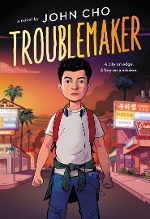Five questions for John Cho and Sarah Suk
Troublemaker (Little, Brown, 10 years and up) is the middle-grade debut — starred by The Horn Book — of acclaimed actor John Cho, co-written by YA author Sarah Suk. The story takes place in 1992 and follows one (fictional) Korean American preteen’s experiences and observations surrounding what were then called the L.A. Riots.
Troublemaker (Little, Brown, 10 years and up) is the middle-grade debut — starred by The Horn Book — of acclaimed actor John Cho, co-written by YA author Sarah Suk. The story takes place in 1992 and follows one (fictional) Korean American preteen’s experiences and observations surrounding what were then called the L.A. Riots. John was recently at ALA Annual, in conversation with Children’s Literature Legacy Award winner Grace Lin, and is now back on location and currently filming.
1. John, how was your time at the American Library Association conference?
 John Cho: It was so fantastic to be in the company of librarians, the most essential of workers, especially since they were so kind to me as a kid who relied on books to get by in the world.
John Cho: It was so fantastic to be in the company of librarians, the most essential of workers, especially since they were so kind to me as a kid who relied on books to get by in the world.
2. How did this collaboration come to be, and what was the writing process like?
Sarah Suk: John was looking for a co-writer and I was drawn to the idea of working on a middle-grade project about the L.A. Riots. I live in Canada, and at the time we were writing the book he was in New Zealand, so the process consisted entirely of video calls and emails and sending pages back and forth across the globe (digitally). For me, co-writing this book was a very intensive, rewarding experience, and I feel grateful to have had the opportunity to be part of it.
3. This is a work of historical fiction, but did either of you have specific background knowledge or personal memories of what were then called the L.A. Riots? Did your research uncover anything especially surprising?
SS: Personally, I’d heard a lot of stories about the L.A. Riots growing up and how it impacted the Korean American community, which is what made me interested in Troublemaker in the first place. To be honest, I don’t recall when I first heard of the events. It almost feels like something I’ve just always known about. However, I definitely learned a lot more during our research. We watched documentaries, read articles, interviewed people. It was a very immersive process.
As far as surprising goes, I found it unsettling how much the events of the 1992 Riots reflected our present-day current events. It was very discouraging at times, and I found myself thinking, Has there really been no progress? But at the same time, there are so many activists who have done tremendous work in the past thirty years, and that certainly can’t be ignored. There were also no middle-grade books like this when I was a kid, so I believe the fact that these stories are getting out there to a wider audience now means that change is happening, no matter how discouraging it can feel sometimes.
JC: Probably the most intriguing piece of research was from an interview with Richard Choi, a broadcaster at Radio Korea at the time. In addition to giving us his personal perspective on the event, he let us know that Koreans would call in to the radio station with all sorts of questions that would be small Google searches today (“laundromat near me” or “where can I find a notary?”). I found this incredibly entertaining, and we put a bit of it in the book!
 4. John, we imagine your day-job requires openness and vulnerability — how does middle-grade fiction writing compare?
4. John, we imagine your day-job requires openness and vulnerability — how does middle-grade fiction writing compare?
JC: In my view, the quality required in both acting and writing middle-grade fiction is empathy. Seems hard to come by these days, so it was a pleasure to think about multiple characters and be on all their sides.
5. Sarah, since this is our Back-to-School issue we have to ask: Jordan gets suspended, but what’s the most trouble you’ve ever gotten into at school? And is there a favorite teacher you’d like to shout out?
SS: I never got caught, so I never got in trouble! Honestly, shout out to all the teachers who put up with reading my weird creative writing projects. Thanks for all your encouragement (and to those who gave out stickers, thanks for those too)!
From the July 2022 issue of Notes from the Horn Book.
RELATED
ALREADY A SUBSCRIBER? LOG IN
We are currently offering this content for free. Sign up now to activate your personal profile, where you can save articles for future viewing.







Add Comment :-
Be the first reader to comment.
Comment Policy:
Comment should not be empty !!!